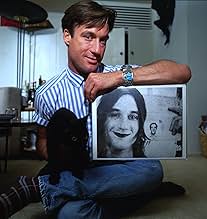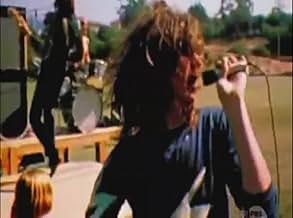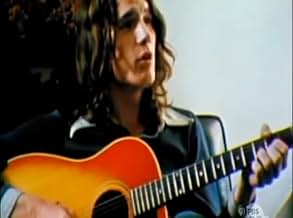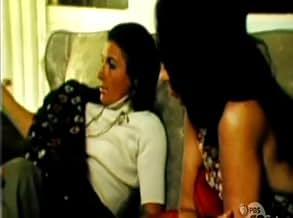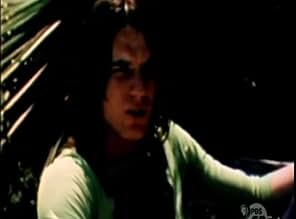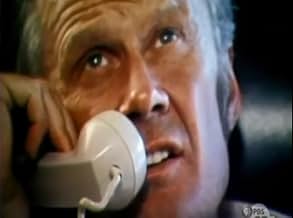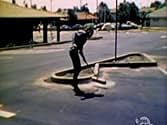Follows the real lives of the Loud family, a motley group of suburbanites.Follows the real lives of the Loud family, a motley group of suburbanites.Follows the real lives of the Loud family, a motley group of suburbanites.
Browse episodes
Featured reviews
While channel-surfing last night I came across what appeared to be an old, fuzzy color film of a drag queen review on Public TV last night. Intrigued, I looked it up and discovered it was an episode of the old pioneering reality series "An American Family," something I had completely forgotten for the last 30 years. This was the episode where Pat Loud goes to New York to visit with her son Lance, who was openly gay and living beyond his means at the Chelsea Hotel amongst other arty young gay men. This must have been pretty shocking stuff for the early 1970s. I really knew nothing about Lance, but listening to his very young self rambling incoherently about what he wanted out of life, I felt a bit sad for him, and on searching the Internet the next day I found out that he had died from complications of AIDS in 2001. He lived a colorful life that was not without success (punk band front man, journalist), but back then in the 1970s he looked to me like one sad, confused kid.
I still recall the media hype surrounding this series, and watching the premier back in 1973 when it first aired. What struck me most about this California family then was their considerable affluence, so foreign to my own life experience. I remember seeing a report, aired some time after the series had run, in which Corporate executive Bill Loud (the father) complained about the effect it had on the life of his family, and how his co-workers regarded him. That "Lance in New York" episode certainly must have given those old-fashioned corporate guys a good chuckle. But the report also spoke to the vehement class hatred which the series had unexpectedly stirred up. Letters sent to the Loud family contained threatening statements like "you'd better watch out for your kids," and so on. I can, in fact, vividly recall the Loud siblings being introduced one by one in that premier episode, and the shout of disdain my mother issued when the youngest son was shown noisily practicing his trombone in his bedroom. Why that disdain for such an innocent activity? Well, if you've spent your entire life living in cramped urban apartments, you know that you can't let your child learn the friggin' trombone at home (assuming you can buy the damned thing for him in the first place), unless you want to risk eviction. Envy? Yeah, sure, but sometimes it gets the better of you. Class hatred in this country seems likely be exacerbated in the next few years by both the major political parties. Some things never change.
This New York episode was certainly a fascinating time capsule of the late hippie era. I wonder if you can still climb to the top of a fountain in the park (as someone was shown doing in this episode) without getting arrested in what is still pretty much Giuliani's New York?
I still recall the media hype surrounding this series, and watching the premier back in 1973 when it first aired. What struck me most about this California family then was their considerable affluence, so foreign to my own life experience. I remember seeing a report, aired some time after the series had run, in which Corporate executive Bill Loud (the father) complained about the effect it had on the life of his family, and how his co-workers regarded him. That "Lance in New York" episode certainly must have given those old-fashioned corporate guys a good chuckle. But the report also spoke to the vehement class hatred which the series had unexpectedly stirred up. Letters sent to the Loud family contained threatening statements like "you'd better watch out for your kids," and so on. I can, in fact, vividly recall the Loud siblings being introduced one by one in that premier episode, and the shout of disdain my mother issued when the youngest son was shown noisily practicing his trombone in his bedroom. Why that disdain for such an innocent activity? Well, if you've spent your entire life living in cramped urban apartments, you know that you can't let your child learn the friggin' trombone at home (assuming you can buy the damned thing for him in the first place), unless you want to risk eviction. Envy? Yeah, sure, but sometimes it gets the better of you. Class hatred in this country seems likely be exacerbated in the next few years by both the major political parties. Some things never change.
This New York episode was certainly a fascinating time capsule of the late hippie era. I wonder if you can still climb to the top of a fountain in the park (as someone was shown doing in this episode) without getting arrested in what is still pretty much Giuliani's New York?
I saw this documentary, most of it, over a decade ago, and I would like to see it today more than ever, because with the passing of time, the past becomes even more fascinating. In fifty years it will be even more fascinating. It gets better and better, as this slice of life recedes into the past. Of course, the family is also inherently interesting and likable. Not any family would do. There could be countless such shows, yet we seem to prefer fiction to reality. And so, this one remains all the more valuable because of its sheer rarity. Are there boring parts? Probably, but even boredom is interesting if one is interested. No need to be fascinated all the time.
An early version of the peek and see webcams of today like MTV's original'Real World' and 'Jennicam', the William Loud family of Santa Monica California allowed a television crew [PBS] to set up a camera and photograph >the Loud family in their daily activities barbeques, sibling hassles, petty squabbles between Pat Loud and her husband Bill, it was certainly a very unusual thing, this documentary it was sort of like peeking over your neighbor's fence and spying on them...a most unusual television production!
I saw it when it was first ran and taped it when it was repeated during the first Gulf War.
Despite all the pontificating and finger-pointing the Louds come off as quite a nice family. Divorce didn't "tear them apart" at all. They're still connected to one another to this very day.
Lance was of course the breakout 'star" of the show, thanks to episode for. The critics claimed he "came out" in this episode. But Lance was never "in," and his whole family adored him. Bill's disapproval had less to do with Lance's sexuality than the fact that he was goofing off too much and should set some goals in life. Lance tried a number of them, with mixed success, but he remained a terrific guy. (I got to know him personally as we were both writing for "The Advocate" and had many mutual friends.) His memorial service (captured in the documentary sequel "ADeath in An American Family" ) was quite an occasion, bringing together all manner of people in the arts and all the Loud family to celebrate Lance's life.
Despite all the pontificating and finger-pointing the Louds come off as quite a nice family. Divorce didn't "tear them apart" at all. They're still connected to one another to this very day.
Lance was of course the breakout 'star" of the show, thanks to episode for. The critics claimed he "came out" in this episode. But Lance was never "in," and his whole family adored him. Bill's disapproval had less to do with Lance's sexuality than the fact that he was goofing off too much and should set some goals in life. Lance tried a number of them, with mixed success, but he remained a terrific guy. (I got to know him personally as we were both writing for "The Advocate" and had many mutual friends.) His memorial service (captured in the documentary sequel "ADeath in An American Family" ) was quite an occasion, bringing together all manner of people in the arts and all the Loud family to celebrate Lance's life.
One of the key aspects that makes this series compelling is the director's insistence that it somehow adheres to strict rules (if such are even theoretically possible) of cinema Veriee. So much of the "reality" we observe in this precursor to the current deluge of reality shows is very subtly contrived. Given the fact that Pat and Bill were on the outs well before the series started, plus the fact that Lance had already come out, much the seemingly real-time tension viewers experience is really quite contrived in much the same manner as a scripted soap opera. The show--even in all of its heavy handed scandal-mongering--does illustrate the strains present in many modern nuclear families and does elicit much interest if only for the fact that it captures the strange transition between the spontaneous daily drama of life as seen from a fly on the wall and the media's shaping of such drama to suit its own thesis. By watching Lance, who even goes so far as to tip off the audience by self-consciously parodying his on-stage persona, we can readily observe the innocent wonder years of PBS well before it grew into the great dictator of perception that it is today.
Did you know
- TriviaThe creation and production of "An American Family" is dramatized in the 2012 Hollywood film "Cinema Verite (2012)" (which is named for the technique of filming a movie to convey candid realism).
- ConnectionsFeatured in Television: The Rise and Fall of the Documentary (1985)
- How many seasons does An American Family have?Powered by Alexa
Details
- Runtime12 hours
- Color
Contribute to this page
Suggest an edit or add missing content


